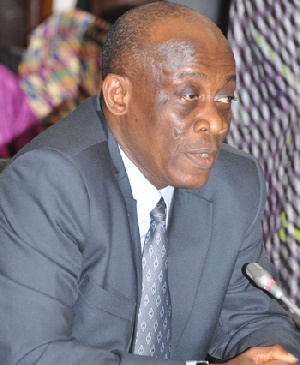Minister of Finance Seth Terkper attempted on Wednesday to comfort Ghanaians worried by rising cost of living with assurances that the medium-term outlook is positive despite the short-term harsh effects of fiscal consolidation.
Presenting his mid-year fiscal review and supplementary estimates to MPs in Accra, he said despite setbacks, government is poised to make Ghana a fully-fledged middle-income country with opportunities for all.
He added that “some of the measures [to achieve this goal] will be painful in the short term, but will no doubt be beneficial in the long run.”
The Finance Minister’s review of the 2014 budget was widely expected, as it was one of the main recommendations in the consensus that emerged from the national economic forum held in May.
“Developments in both the global and domestic economic environment have necessitated a revision of the macroeconomic framework and assumptions underlying the 2014 budget,” Mr. Terkper said. “The current energy challenge, rising inflation and interest rates, as well as exchange rate depreciation pose a strong downside risk to the achievement of the growth target for the year.”
He said government will now target a GDP growth rate of 7.1 percent, instead of 8 percent in his budget statement read in November. The end-year inflation target was also revised from a ceiling of 11.5 percent to 15 percent – which is equal to the inflation rate measured in June.
The government is also expecting to rebuild international reserves from 2.5 months of import-cover to a minimum of three months to help the Bank of Ghana (BoG) defend the cedi against further depreciation.
The local currency is down 27 percent against the dollar this year, and its slide has increased inflation to the highest in four and a half years while causing utility and transport costs to surge.
Mr. Terkper said government will tackle the problem by boosting crude oil and gas production to curtail imports of fuel for power generation. Consumption of locally-manufactured products will also be encouraged, he said, while the central bank will use swaps to manage its foreign exchange reserves to improve its interventions in the currency market.
On the budget deficit, the Finance Minister revised the gap expected for the year to 8.8 percent of GDP from an earlier 8.5 percent, after asking MPs to approve an extra GH¢1.2billion of borrowing.
The revision is due to higher interest costs, higher spending on subsidies, higher expenditure on wages and lower-than-projected tax revenue and grants.
Mr. Terkper said tax-hikes and removal of subsidies since 2013 became necessary to correct fiscal slippages that raised the deficit to 11.8 percent of GDP in 2012. There were no tax increases in the supplementary budget, but government revenue was projected to increase slightly due to a net positive effect of the cedi’s depreciation on oil revenues and grants.
Mr. Terkper, who has been adamant that government will not seek financial assistance from the International Monetary Fund to address the economy’s vulnerabilities, painted a bright medium-term outlook and took pride in the country’s strong GDP growth amid the fiscal stabilisation measures.
He said the encouraging indicators of the future are the expected rise in oil and gas production as new fields are developed; the recovery of cocoa prices; services sector expansion; growing foreign direct investments; and revenue and expenditure management reforms.
Business News of Friday, 18 July 2014
Source: B&FT

















